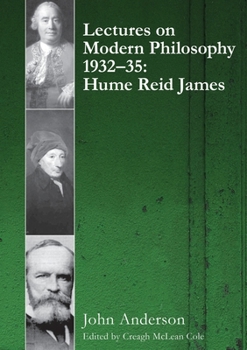Lectures on Modern Philosophy 1932-35: Hume, Reid and James
These lectures from the 1930s on David Hume, Thomas Reid and William James trace the development of John Anderson's empirical realism, helping to distinguish his position from "English" empiricism, Scottish commonsense and direct realism, radical empiricism and pragmatism. They also demonstrate Anderson's approach to the study of the history of philosophy. The lectures on David Hume place Anderson in direct opposition to his teacher and colleague...
Format:Paperback
Language:English
ISBN:1920898867
ISBN13:9781920898861
Release Date:April 2008
Publisher:Sydney University Press
Length:268 Pages
Weight:0.71 lbs.
Dimensions:0.6" x 5.8" x 8.3"
Related Subjects
PhilosophyCustomer Reviews
0 rating





